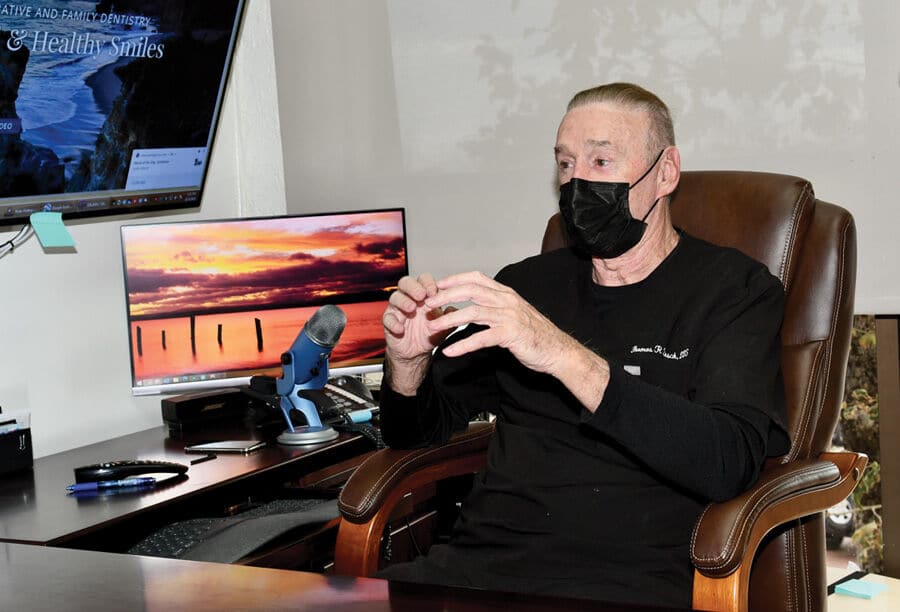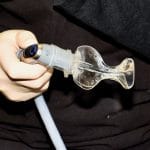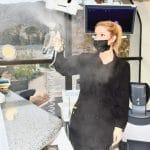A visit to Dr. Thomas Hirsch’s Civic Center Way office in Malibu goes like this: You call up to the front desk to be given the go-ahead so you don’t run into any other patients while heading upstairs. You walk through the doors—kept wide open so there’s no need to touch any doorknobs—and fill out a safety questionnaire. Been traveling? Been on any buses lately? “Yes” to any questions means getting sent home for another day. Then, one of the staff members aims a hand-held thermometer at your forehead.
After a little wait, the dentist will see you. Before you can sit down, though, one of his assistants mists both you and the room with a solution of hydrochlorous acid, an electrolyzed saltwater bi-product commonly used to disinfect hospital operating rooms. Then, when you’re in the chair, it’s time for the Isolite, a tool similar to a football mouth guard that both chases shadows out of your mouth and significantly reduces splatter and aerosols, decreasing COVID-19 risk.
Both the hydrochlorous sprayer and the Isolite are inventions of Hirsch’s own. He and his brother, an industrial designer, worked together to create the Isolite back in the ‘80s after Hirsch’s rolling chair kept damaging the fiber optic cables he was using to help light patients’ mouths.
Though they took a dip when the pandemic first hit, Isolite sales are now booming. Hirsch sells the tool through his Santa Barbara-based company, Zyris. He now estimates that he and his sibling have penetrated about 20 percent of the U.S. market, largely due to pandemic-induced need.
The hydrochlorous acid is a newer Hirsch creation, invented only a few months ago and now being tested out at the Malibu dental practice and select others around the country. His staff uses the product to spray themselves and the rooms down multiple times a day. The process adds around five extra minutes to each appointment.
Hirsch is coming up on his 48th year in Malibu. He opened the practice two years out of USC dental school, after spending a year commuting into Santa Monica from Malibu, and he hasn’t moved from the spacious, glassy corner office ever since.
The dentist entered the industry after he and a friend cut school at age 17 to go skiing at Mammoth, where he ended up on a ski lift next to an older gentleman.
“Here I am, he’s 45, I’m 17, and we start talking,” Hirsch recalled. “He says, ‘Shouldn’t you be in school?’ I said, ‘Yeah, but the snow was so good so my buddy and I cut today. How ‘bout you? Are you on vacation?’ The man said, ‘No, no, I work.’”
The teenage Hirsch was surprised.
“I said, ‘Well, what do you do?’” “He said, ‘I’m a dentist.’”
According to the man on the ski lift, there’s room for flexibility when you own a dental practice.
“I ski during the week and work on the weekends,” he told Hirsch.
Young Hirsch thought: “OK, that’s it.”
Hirsch has made a lot of smiles pretty—perhaps most memorably former Canadian Prime Minister Stephen Harper, who once rolled up to the Civic Center with a motorcade of six black Cadillac Escalades just to see the doc.
What Hirsch loves most is the instant gratification: “You do some veneers, it instantly looks fabulous and phenomenal. Somebody’s in pain? You get ‘em out of pain.” Once, Hirsch treated a man who had chipped his tooth—not an emergency, except for the fact that it was the man’s 40th wedding anniversary and he was planning on taking his wife out to dinner. Hirsch worked his magic: the man “walked in, he walked out, and I gave it to him as an anniversary present.” Having been in Malibu for decades, his business has weathered dozens of fires—”Woolsey turned this place into a ghost town”—earthquakes, a landslide that closed PCH for six months and the economic downturn of 2008.
Another event he pointed to that one might not immediately think of as parallelling right now: the AIDS epidemic, during which dentistry saw a significant downturn over fear of cross-contamination. It was for this reason the dental industry adopted so many of the sterilization standards it uses today.
When the pandemic hit, Hirsch’s business slowed a bit, but he stayed open with a skeleton crew consisting of an assistant and front desk person for emergencies. By now, he’s hired the whole gang back full time, adapting to the changing times as the practice has since it was founded nearly 50 years ago.



